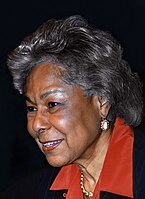
Photo from wikipedia
To the Editor: Clinician educators are the backbone of training for our society’s future healthcare providers. Despite this, academic medical centers—especially those at large research universities—provide limited resources for clinician… Click to show full abstract
To the Editor: Clinician educators are the backbone of training for our society’s future healthcare providers. Despite this, academic medical centers—especially those at large research universities—provide limited resources for clinician educator faculty development. With increasing demands related to patient care, it is challenging for clinician educators to find time to engage in academic pursuits such as teaching, curriculum development, scholarship, and faculty development [1, 2]. This may contribute to clinician educator attrition at academic medical centers and reduce the availability of clinician educator role models for early career faculty and trainees. In response to this challenge, academic medical centers have developed initiatives to enhance clinician educator faculty development [3].We identified the challenges of academic advancement for clinician educators at the Johns Hopkins University School of Medicine (JHUSOM) Department of Psychiatry and Behavioral Sciences, especially among early career faculty, and envisioned a longitudinal faculty development program specific to clinician educators to address these challenges. We subsequently developed the Psychiatry Academy of Clinician Educators (PACE) and describe below the implementation and future plans for this program. We initially identified a group of 15 early-mid career clinician educator faculty within the department and invited these faculty members for an informal group discussion. Seven of the 15 invited faculty participated in the discussion, which was focused around several questions including knowledge about the clinician educator pathway to promotion, interest in a clinician educator academy, current use of clinician educator resources and future needs, and barriers to success as a clinician educator. The group discussion revealed the following themes: the lack of clinician educator role models/mentors in the department; the disincentives to teach and, at times, active discouragement by later career faculty to pursue a clinician educator career; and the perception that data-driven, original research papers are the most important form of scholarship for promotion. In addition to soliciting discussion, we asked the group what they would envision in an academy for clinician educators. The group responded by identifying the following needs: a better understanding of the guidelines for promotion as a clinician educator and of currently available clinician educator resources, senior and peer mentorship, opportunities for group scholarship, “protected” time for faculty development courses (e.g., curriculum development course [4] and teaching skills course [5] offered through the institution), and performancebased effort for teaching. Using this key stakeholder feedback, we developed a mission statement to guide the formation of an academy, excerpted here: “The Academy’s mission is to promote an educational climate that accelerates advances in psychiatric teaching and learning, champions clinician educator careers, and improves health. The Academy will be an indispensable crucible for innovation in psychiatric clinician-education, by fostering development of effective and novel curricula. It will also be an essential resource for career development in psychiatric clinician-education, by promoting and rewarding teaching excellence. In addition, the Academy will serve as an important source for scholarship in psychiatric clinicianeducation, by encouraging and nurturing scholarly work, and provide a vital voice for psychiatric clinician educators at Johns Hopkins and beyond, by enhancing the status of clinician educator faculty.” Once funding was secured, we put out a call for applications for one member, to be selected from the faculty at the Johns Hopkins Bayview Medical Center Department of Psychiatry and Behavioral Sciences. The application included * Neda F. Gould [email protected]
Journal Title: Academic Psychiatry
Year Published: 2020
Link to full text (if available)
Share on Social Media: Sign Up to like & get
recommendations!